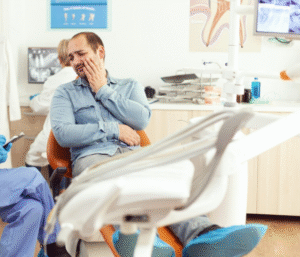Emergency dental situations can arise at the most inconvenient moments, resulting in significant distress and necessitating quick intervention. Such situations often require quick thinking and decisive action, Whether due to an accident, unexpected pain, or a pre-existing condition flaring up. Knowing how to handle these dental emergencies makes a world of difference in such moments. Consider incidents like severe toothaches, a cracked tooth, or even a lost filling. Knowing when to call an emergency dentist is equally crucial to ensure you get the proper care when you need it the most.
The nature of typical dental crises, specific instructions for handling them at home, and the justification for getting prompt expert help when needed are all covered in this extensive book. You’ll also learn about preventive strategies to help you avoid specific dental crises. Equipping yourself with this information bolsters your defense against unexpected oral issues, thereby safeguarding your dental health.
This Content Will Help You:
- Gain a deep understanding of the various dental emergencies and their definitive symptoms.
- Learn different immediate care techniques that can be used at home to manage a dental emergency temporarily.
- Recognize the situations that warrant professional dental intervention and understand why immediate care is crucial.
- Implement preventative dental care measures to reduce the likelihood of emergencies.
What Are Common Dental Emergencies?
Common dental emergencies encompass a variety of situations, some warranting immediate dental care. From a severe toothache to a chipped tooth or a lost filling, identifying these issues is the first step toward appropriate action. Recognizing the signs of a true dental emergency, such as intense pain or swelling, can help distinguish cases that need quick intervention from those that can wait for a regular appointment. If you’re experiencing symptoms like an abscessed tooth, uncontrollable bleeding, or significant facial swelling, you must seek immediate assistance from a dental professional.
Immediate Steps to Take During a Dental Emergency
Knowing what immediate actions to take when faced with a dental emergency can be vital. For instance, when a tooth gets knocked out, the priority should be to keep the tooth moist. To significantly improve the odds of successful reinsertion, try to put it back in its socket or store it in milk on the way to the dentist. Similarly, if you have a broken tooth, you should use warm water to rinse your mouth and a cold compress to reduce swelling in your cheeks. Temporary relief can be obtained through over-the-counter pain medications, but one should never place aspirin directly on the gums as this might cause additional damage.
When to Seek Professional Help
One key aspect of managing dental emergencies effectively is knowing when to seek professional help. If faced with symptoms such as severe pain, bleeding that won’t stop, or swelling that impacts breathing or swallowing, it’s crucial to see a dentist. Even when the situation seems manageable at home, professional evaluation ensures no underlying issue might worsen. Temporary pain relief methods like dental cement kits for lost fillings or clove oil for toothaches can be effective until a dental appointment is available. However, they still hesitate to seek professional care.
Preventative Measures to Avoid Dental Emergencies
Prevention is always better than cure when it comes to tooth health. By developing a solid oral hygiene routine that includes regular brushing and flossing, dental issues like cavities and gum disease—which often arise before emergencies—can be significantly reduced. Furthermore, regular dental check-ups deal with existing problems and identify and mitigate potential risks early. For those engaging in sports or similar activities, wearing a mouthguard provides essential protection against dental injuries.
Health experts emphasize the role of routine dental visits in maintaining oral health, reinforcing the idea that prevention and regular care are key to long-term dental health.
Children’s Dental Emergencies: What Parents Need to Know
Dental emergencies can also occur in children, making it essential for parents to be prepared. As children are prone to accidents that can affect their dental health, it is crucial to know how to handle situations like a chipped tooth or a foreign object stuck in the mouth. Building a relationship with a pediatric dentist allows for tailored advice on avoiding such emergencies and maintaining a child’s oral health. Encourage good habits early and ensure children wear protective gear for physical activities as a preventive measure.
Finding Emergency Dental Care Nearby
Finding reliable emergency dental services is crucial when an unexpected problem arises. Building a list of potential dental clinics that offer emergency services, reading reviews, and obtaining recommendations can guide you toward the best options available. When you need their services, having handy questions about their procedures and payment options can streamline the visit and ensure you’re well-prepared for further care.
Long-Term Care After a Dental Emergency
Following up with long-term care after the immediate emergency is resolved helps faster recovery and prevents recurrence. Ensure you adhere closely to any prescribed medication regimes and instructions for diet or activity restrictions. Adopting healthier habits, abandoning harmful practices like smoking, and committing to regular dentist visits can improve oral health resilience and overall well-being.
By internalizing proactive habits and seeking regular dental advice, you can better equip yourself against future dental emergencies, ensuring your smile stays bright and healthy for years.

Asad Arshad, a prolific author of over 50+ websites across various niches, is open to collaboration opportunities. 🌐 For guest posts, reach out to him to benefit from his vast expertise and connect with a diverse audience. 📬




